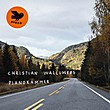|
|

Christian Wallumrød 'Christian Wallumrød [he's Susanna's brother, and he's the brother of drummer/composer Fredrik Wallumrød - one big, musical family for sure] is (has for many years been) 'regarded as one of the most prominent and original musical creators in Norway. He is instantly identifiable both as a composer and as a pianist, while at the same time any attempt to categorise his music is doomed to fail.'Outstairs (2013), Fabula Suite Lugano (2009), The Zoo Is Far (2006), A Year From Easter (2004), and Sofienberg Variations (2001)]. The Christian Wallumrød Trio recorded No Birch in 1996. He has also been group, the trio Close Erase, as well as the floating/rotating ensemble Jazzpunkensemblet and Audun Kleive's Generator X], he has 'erased the borders between jazz, hymns, gospel, folk music, baroque music and contemporary music'. Hubro states that he (on his first solo album) 'has come up with his own special twists and turns, on where he 'presents an inspired solo album that is as challenging as it is enjoyable' (according to his label Hubro). In addition, he has been part of numerous collaborative projects (national as well as world-wide) counting the group Dans les Arbres, Susanne Sundfør, Nils Petter Molv&aslash;r, Ricardo Villalobos & Max Loderbauer, Karl Seglem, Jan Bang, Garth Knox, Sidsel Endresen & (his brother-in-law) Helge 'Deathprod'Sten, Arve Henriksen, Odd Børretzen & Lars Martin Myhre, DJ Strangefruit, Ståle Storløkken, Johannes Eick, Erik Honoré, Oslo Sinfonietta plus others. He seems to be a man for all/any seasons. Pianokammer was recorded in a number of venues and on a variety of grand pianos, where he experimented with 'different recording techniques, overdubs, natural resonance and editing', presenting terms of music where he 'alternates successfully between inquisitive, challenging excursions and catchy, carefree, melodic pieces. The music fluctuates between very intimate and far out'. Yet, it is far out, and far off, but it is close and present. His compositions are not 'losing the kind of chamber music dynamism'. 'Aquatic plants have potential as feedstuffs in certain nations, but the economics of harvesting and processing would prohibit their direct utilization as a forage in technologically advanced nations. However, nutrient pollution is accelerating rates of eutrophication of natural waters in many areas. Aquatic plants produce large standing crops and accumulate large amounts of nutrients. Systems based on the harvest of aquatic plants have potential application in removing nutrients from effluents and natural waters.' This is the abstract to Claude E. Boyd's 1970 book "Vascular quatic plants for mineral nutrient: Removal from polluted waters" (tag: Economic Botany). Dr. Claude E. Boyd is a professor within the fields 'entomology and chemistry', 'environmental toxicology', and 'water and aquatic soil chemistry', as he is concerned with (or focusing on) water and environmental impact. I don't know if this is the theme for Wallumrød's track "Boyd 1970" from his new album, but the theme throughout Wallumrød's music seems to circle environmental issues. His music is warm sounding, quiet and breathing piano chamber songs. Pianokammer (Piano Chamber) holds six bleak, yet colourful compositions. The album 'kicks off', well, slowly takes off in a gliding, ambient way with "Fahrkunst". This is art music, or instrumental music as art. Grand piano magical mystery tours. Songs that float and fluctuate through exciting musical landscapes, throughout a broad spectre of emotional soundscapes. Soundspaes that are gloomy, moody, spooky as well as most spectres of musical emotions you can stir. The highly evocative, captivating and thrilling pure piano-drive of "Hoksang". It is for sure a spellbinding composition. He is a traveller of space and time, as well as place. "Fahrkunst"'s 'sequel' "Second Fahrkunst" is less ambient, but is nevertheless an exciting and experimental collection or palette of sparse rhythms and melodies or tone colour. It is surely some timbre mystique. The aforementioned "Boyd 1970" takes Wallumrød back to the place he belongs: by his piano, dwelling with moments of time, of contemplation and reflection. Less is more, more or less. Giving you time to dwell, to have some afterthought. Wallumrød is taking you through his melodically, slow-motion-like circles. For dipping and diving into his most pleasant playpool. This is some comfortable stuff for sure. "School of Ecofisk", and the closing (and longest) track "Lassome" see Wallumrød (maybe) at his most playful and gently sparkling, leaving you flowing in his tiny waves or web of sound. Stick to his organic comfort zone, and you will come out as a changed person. For the better of a transformation that is. Pianokammer is musical anaesthetics. It is both numbing as well as sedative. For your pleasure. Fully and completely. Copyright © 2015 Håvard Oppøyen
|
| © 2015 Luna Kafé |